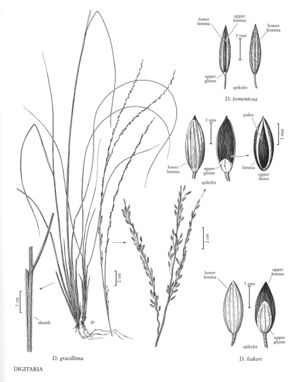Difference between revisions of "Digitaria bakeri"
FNA>Volume Importer |
imported>Volume Importer |
||
| (5 intermediate revisions by 2 users not shown) | |||
| Line 24: | Line 24: | ||
-->{{#Taxon: | -->{{#Taxon: | ||
name=Digitaria bakeri | name=Digitaria bakeri | ||
| − | |||
|authority=(Nash) Fernald | |authority=(Nash) Fernald | ||
|rank=species | |rank=species | ||
| Line 31: | Line 30: | ||
|basionyms= | |basionyms= | ||
|family=Poaceae | |family=Poaceae | ||
| + | |illustrator=Linda A. Vorobik;Hana Pazdírková | ||
| + | |illustration copyright=Utah State University | ||
|reference=None | |reference=None | ||
|publication title= | |publication title= | ||
|publication year= | |publication year= | ||
|special status= | |special status= | ||
| − | |source xml=https:// | + | |source xml=https://bitbucket.org/aafc-mbb/fna-data-curation/src/200273ad09963decb8fc72550212de541d86569d/coarse_grained_fna_xml/V25/V25_1056.xml |
|subfamily=Poaceae subfam. Panicoideae | |subfamily=Poaceae subfam. Panicoideae | ||
|tribe=Poaceae tribe Paniceae | |tribe=Poaceae tribe Paniceae | ||
Latest revision as of 17:55, 11 May 2021
Plants perennial; cespitose. Culms 40-90 cm, erect, unbranched, glabrous; nodes 1-2. Sheaths densely hairy, hairs papillose-based; ligules 0.8-2.2 mm; blades 10-24 cm long, 2-4.5 mm wide, with papillose-based hairs. Panicles with 2-3 spikelike primary branches on 4-7 mm rachises; secondary branches rarely present; primary branches (5)10-22 cm, axes 0.5-0.6 mm wide, not wing-margined, middle portions of the branches bearing spikelets in groups of 3; pedicels appressed to the axes. Spikelets 2.3-2.4 mm, lanceolate to oblanceolate-elliptic; lower glumes absent; upper glumes 1.4-1.5 mm, more than 1/2 as long as the spikelets, 3-veined, truncate to acute, mostly glabrous, apices sparsely hairy; lower lemmas about as long as the spikelets, 7-veined, mostly glabrous, apices sparsely hairy; upper lemmas 2.3-2.4 mm, dark brown to black, apiculate; anthers 1-1.1 mm. 2n = unknown.
Discussion
Digitaria bakeri grows in pastures, particularly horse pastures, from Florida through Mexico to Panama. It is probably more widespread in Florida than the map suggests but, because of its inclusion in D. gracillima, little information is available at present.
Selected References
None.
